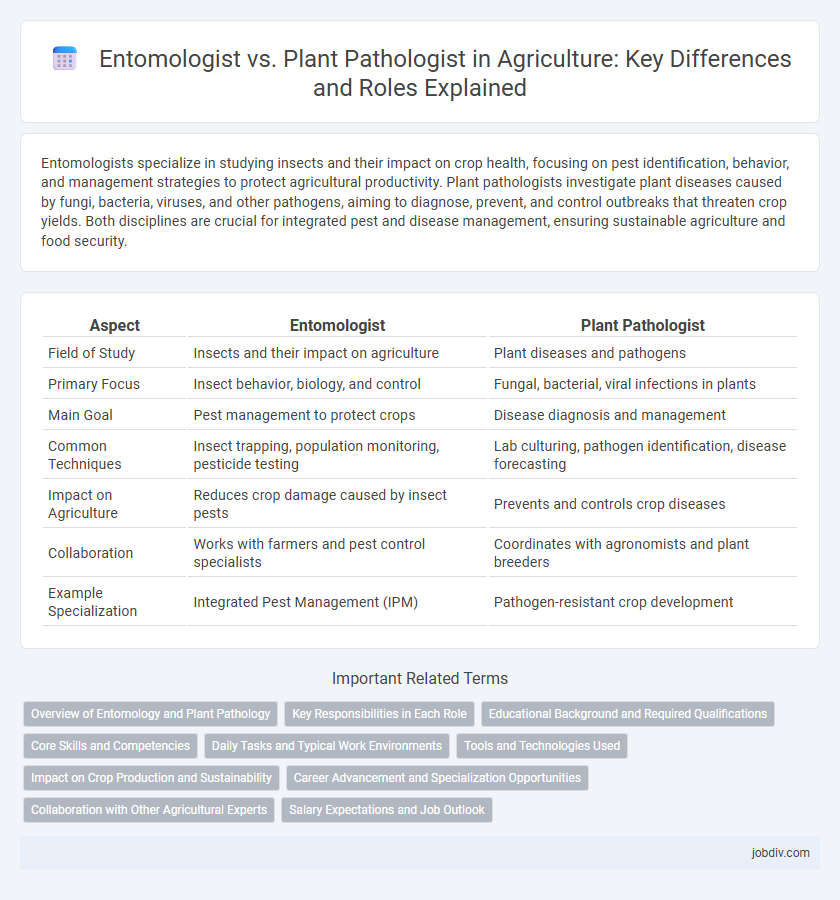Entomologists specialize in studying insects and their impact on crop health, focusing on pest identification, behavior, and management strategies to protect agricultural productivity. Plant pathologists investigate plant diseases caused by fungi, bacteria, viruses, and other pathogens, aiming to diagnose, prevent, and control outbreaks that threaten crop yields. Both disciplines are crucial for integrated pest and disease management, ensuring sustainable agriculture and food security.
Table of Comparison
| Aspect | Entomologist | Plant Pathologist |
|---|---|---|
| Field of Study | Insects and their impact on agriculture | Plant diseases and pathogens |
| Primary Focus | Insect behavior, biology, and control | Fungal, bacterial, viral infections in plants |
| Main Goal | Pest management to protect crops | Disease diagnosis and management |
| Common Techniques | Insect trapping, population monitoring, pesticide testing | Lab culturing, pathogen identification, disease forecasting |
| Impact on Agriculture | Reduces crop damage caused by insect pests | Prevents and controls crop diseases |
| Collaboration | Works with farmers and pest control specialists | Coordinates with agronomists and plant breeders |
| Example Specialization | Integrated Pest Management (IPM) | Pathogen-resistant crop development |
Overview of Entomology and Plant Pathology
Entomology is the scientific study of insects, emphasizing their behavior, ecology, and impact on agriculture, where insect pests can significantly affect crop yields. Plant pathology focuses on diagnosing, managing, and preventing plant diseases caused by pathogens like fungi, bacteria, viruses, and nematodes that threaten food security. Both disciplines collaborate to develop integrated pest and disease management strategies vital for sustainable agricultural productivity.
Key Responsibilities in Each Role
Entomologists study insect behavior, biology, and ecology to develop pest control strategies that protect crops and improve agricultural yield. Plant pathologists diagnose and manage plant diseases caused by fungi, bacteria, viruses, and environmental factors to prevent crop loss and ensure plant health. Both professionals collaborate to enhance sustainable farming through integrated pest and disease management practices.
Educational Background and Required Qualifications
Entomologists typically hold a bachelor's or master's degree in entomology, zoology, or biology, with advanced careers often requiring a Ph.D. specializing in insect science. Plant pathologists usually earn degrees in plant pathology, microbiology, or related agricultural sciences, with emphasis on fungal, bacterial, and viral diseases, often completing a Ph.D. for research or academic roles. Both fields demand strong foundations in biology and chemistry, along with practical experience via internships or laboratory work to develop expertise in pest management or disease control.
Core Skills and Competencies
Entomologists specialize in identifying insect behavior, pest management, and integrated pest control techniques, utilizing expertise in insect biology and ecology to protect crops. Plant Pathologists focus on diagnosing plant diseases, understanding pathogen life cycles, and developing disease-resistant plant varieties through molecular biology and plant pathology skills. Both professions require strong analytical abilities, field research experience, and proficiency in laboratory techniques to support sustainable agricultural practices.
Daily Tasks and Typical Work Environments
Entomologists primarily study insects and their impact on crops, conducting field research and laboratory experiments to manage pest populations, often working outdoors in agricultural fields or greenhouses. Plant pathologists focus on diagnosing and controlling plant diseases, analyzing samples in labs and advising farmers on disease management, typically operating in research facilities, laboratories, or agricultural extension services. Both specialists collaborate with farmers and agribusinesses but differ in their core daily tasks related to pest versus disease management.
Tools and Technologies Used
Entomologists utilize advanced insect traps, pheromone lures, and digital imaging technologies to study pest behavior and population dynamics, enhancing pest management strategies. Plant pathologists employ molecular diagnostics, such as PCR and DNA sequencing, alongside remote sensing and thermal imaging to detect and monitor plant diseases accurately. Both specialists leverage geographic information systems (GIS) and data analytics to optimize crop protection and ensure sustainable agricultural practices.
Impact on Crop Production and Sustainability
Entomologists contribute to crop production and sustainability by studying insect behavior, lifecycle, and pest management techniques that reduce crop damage and improve yield quality. Plant pathologists focus on diagnosing, managing, and preventing plant diseases caused by fungi, bacteria, viruses, and nematodes, thereby enhancing plant health and long-term productivity. Both disciplines integrate sustainable agricultural practices, promoting eco-friendly pest and disease control strategies that minimize chemical use and support resilient crop ecosystems.
Career Advancement and Specialization Opportunities
Entomologists specializing in agriculture advance by focusing on pest management, integrated pest control, and insect behavior, often pursuing roles in research, extension services, or agribusiness product development. Plant pathologists progress by deepening expertise in disease diagnosis, pathogen biology, and crop protection, leading to positions in diagnostic labs, research institutes, or regulatory agencies. Both careers offer specialization opportunities in molecular techniques, biocontrol methods, and sustainable agriculture, enhancing prospects for leadership roles and interdisciplinary collaboration.
Collaboration with Other Agricultural Experts
Entomologists collaborate closely with plant pathologists to identify and manage pest infestations that impact crop health, ensuring integrated pest management strategies are both effective and sustainable. Plant pathologists provide critical insights into disease dynamics, complementing entomological expertise in controlling vectors that transmit plant pathogens. Their joint efforts alongside agronomists and soil scientists enhance crop resilience, optimize yields, and promote eco-friendly agricultural practices.
Salary Expectations and Job Outlook
Entomologists typically earn a median salary ranging from $60,000 to $80,000 annually, with demand driven by pest management and agricultural sustainability initiatives. Plant pathologists have a similar salary range, averaging between $55,000 and $75,000, focusing on disease control and crop health improvement. Both professions are projected to grow moderately due to increasing emphasis on food security and environmentally friendly farming practices.
Entomologist vs Plant Pathologist Infographic

 jobdiv.com
jobdiv.com